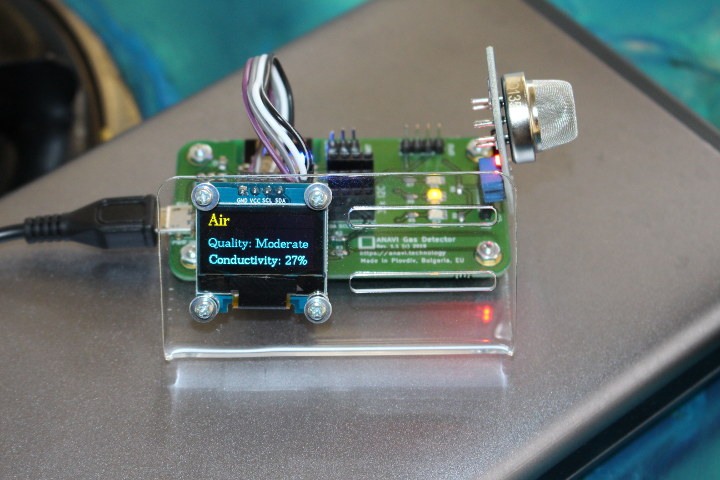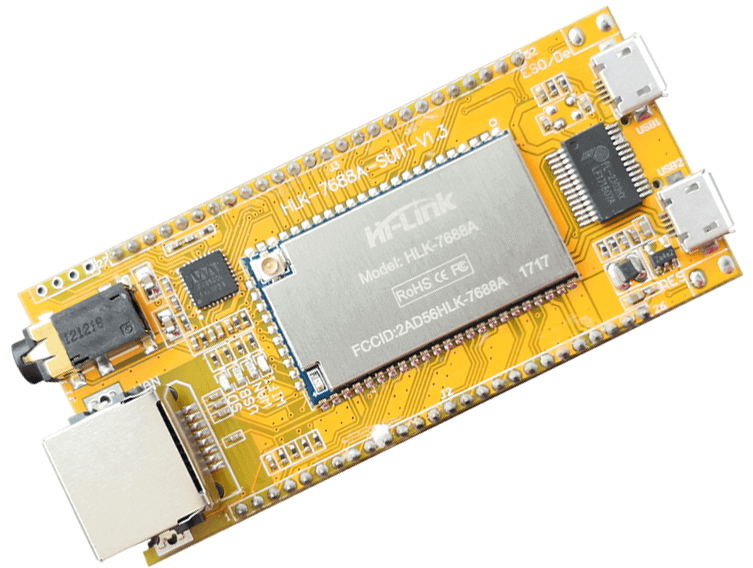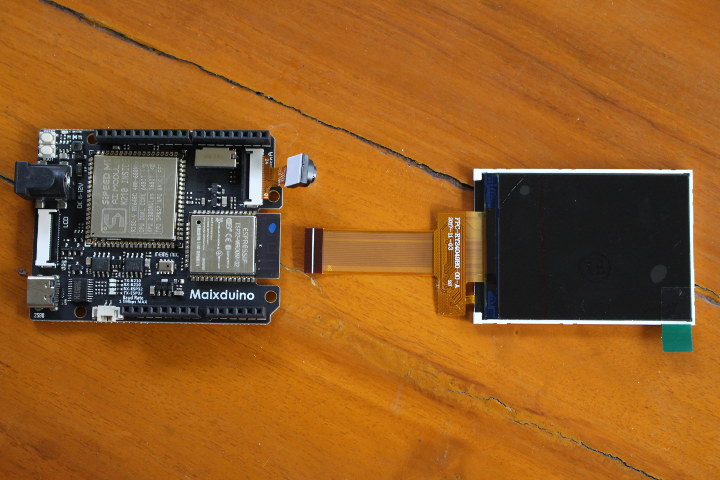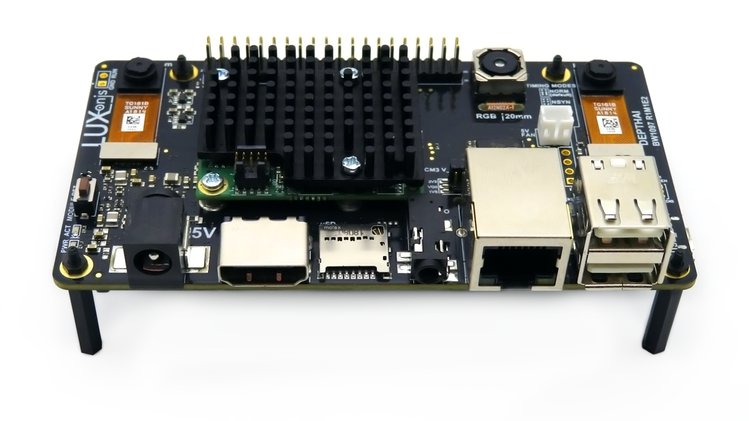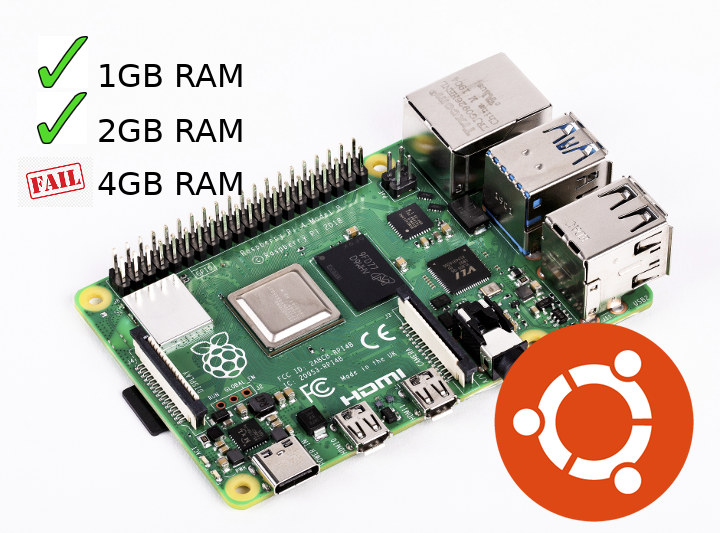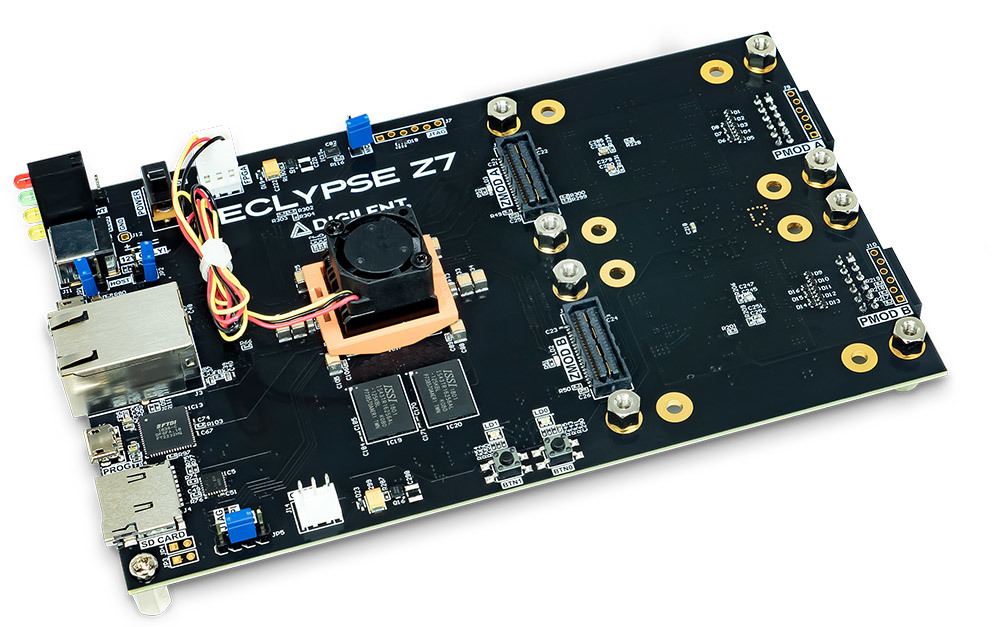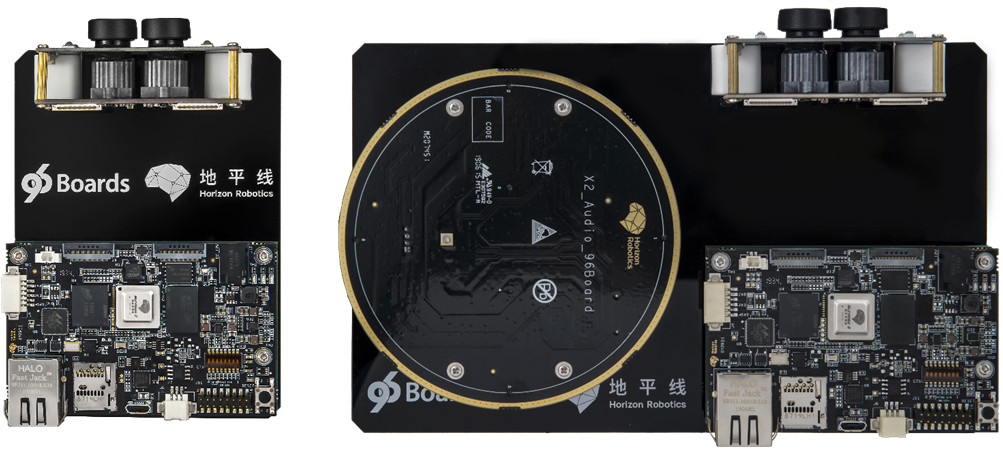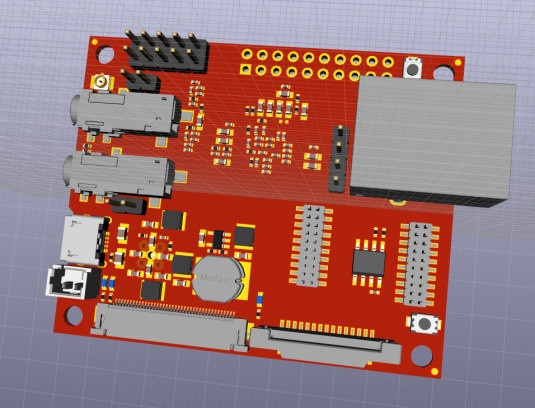Leon ANAVI makes from fun little boards for home automation, either ESP8266 based, or pHAT for Raspberry Pi boards. Earlier this year, I wrote about my experience getting ANAVI Gas Detector with Home Assistant. Now that’s I’m done, I’m giving away the starter kit that includes the ESP8266 board, an acrylic case, an OLED display, a USB to serial adapter, and MQ135 air quality sensor. The board is open-source hardware, meaning everything is open source from the KiCAD files to the Android sketch running on the board. It’s very easy to get started, as you can just connect a USB cable for power, and after configuring WiFi you can see the air quality – either Poor, Moderate or Good – displayed on the OLED display, and you can easily see the data in a web dashboard after setting up Home Assistant. Everything shown in the top photo will be given […]
HLK-7688A OpenWrt Development Board Comes with an Audio Jack
We first tested MediaTek MT7688 MIPS processor in Mediatek Labs’ LinkIt Smart 7688 / 7688 Duo hardware development kits running OpenWrt in 2015 with the boards having a focus on IoT applications. A year later, Widora NEO board launched with an audio jack for connected audio applications, but AFAIK it’s not available anymore. There’s now another OpenWrt audio board based on the processor with HLK-7688A board featuring Hi-Link HLK-7688A module which we previously found in MatchBox LoRaWAN gateway. HLK-7688A board specifications: Wireless Module – HLK-7688A based on MediaTek MT7688 MIPS24KEc processor @ 580 MHz, and equipped with 128MB RAM, 32MB flash Storage – MicroSD card slot Connectivity 802.11 b/g/n WiFi 4 up to 150 Mbps with u.FL antenna connector 10/100M Ethernet Audio – 3.5mm audio jack; 4-pin speaker header, WM8960 audio codec USB – 2x Micro USB ports one USB 2.0 port and one for debugging & power Expansion – […]
Giveaway Week – Maixduino Sipeed M1 RISC-V AI Kit
For the fourth day of Giveaway Week, I’ll give out a kit comprised of Maixduino a RISC-V development board with an AI accelerator in Arduino form factor, a camera, and a 2.4″ color LCD. I tested the Maixduino kit with MicroPython, but it can also be programmed with the Arduino IDE, or Kendryte SDK. It basically allows you to run low-power AI workloads at the edge, i.e. without access to the cloud, such as face detection. To enter the draw simply leave a comment below. Other rules are as follows: Only one entry per contest. I will filter out entries with the same IP and/or email address. Contests are open for 48 hours starting at 10 am (Bangkok time) every day. Comments will be closed after 48 hours. If comments are open, the contest is still going on. Winners will be selected with random.org and announced in the comments section […]
DepthAI Brings AI plus Depth to the Raspberry Pi (Crowdfunding)
Edge computing on the Raspberry PI has been a bit of ups and downs, especially with everyone gearing for AI in everything. The Raspberry Pi, on its own, isn’t really capable of any reliable AI applications. Typical object detection on the Raspberry Pi would get you something around 1 – 2 fps depending on the nature of your model and this because all those processing is done on the CPU. To address this poor performance of AI applications on the Raspberry Pi, AI Accelerators came to the rescue. The Intel Neural Compute Stick 2 is one such accelerator capable of somewhere around 8 – 15 fps depending on your application. The NCS2, which is based on the Myriad X VPU technology, offers so much more than the compute stick delivers, and this is something that the team behind DepthAI has exploited to create a powerful AI module for edge computing […]
Fix for Raspberry Pi 4 4GB model’s USB Ports not Working on Ubuntu 19.10
Ubuntu 19.10 server was recently released with official support for Raspberry Pi 4 SBC. Shortly after I read stories about the USB ports not working on the board, but it took another interesting turn as Canonical now explains the bug only affects RPI 4 with 4GB RAM, and USB works just fine on boards with just 1/2GB RAM. The issue has been identified and it’s been found to be a kernel bug with a solution in the works that being tested. In the meantime, you can access to your Raspberry Pi 4 4GB USB ports by limiting the memory to 3GB in /boot/firmware/usercfg.txt as follows:
|
1 |
total_mem=3072 |
Alternatively here’s the link to an updated kernel provided by Hui Wang with you want to test it out: I built a testing kernel, not only includes the fix for USB host, but also includes all new patches from https://github.com/raspberrypi/linux.git rpi-5.3.y branch (about 107 […]
Digilent Offers 2 Zynq-Based Linux Development Boards Supporting SYZYGY Expansion
Digilent Announces SYZYGY high-speed SBCs Digilent has announced two new SBCs that are ultra-high-speed and built to be more modular than its other boards. The company, which has a great deal of experience in Pmod lower speed FPGA standards has now entered the open-source, SYZYGY high-speed standards with its Eclypse Z7 and the Genesys ZU development SBCs. Background on the Digilent Zybo FPGA SoC SBC We reported on the Zybo development board FPGA SoC from Digilent and that seems to have lead to the latest format for the Eclypse Z7. Zmod There is also a release planned for the new Zmod modules, built to work with both the Eclypse Z7 and the Genesys ZU as SYZYGY compliant expansion modules. Opal Kelly and Zmod expansion The Zmods are Opal Kelly module standard, called SYZYGY, first seen in the Opal Kelly SYZYGY Brain-1 SBC. The standard was developed to jump the gap […]
BOOTPRINT X2 96Boards AIoT Development Kit Features Sunrise 2.0 AI Processor
Horizon Robotics BOOTPRINT X2 is an AIoT / AI computing development kit providing a complete reference solution from device to cloud integration. The board is powered by the company’s Sunrise 2.0 AI edge processor based on the second-generation BPU (“Brain Processing Unit”) architecture that delivers up to 4 TOPS at low power consumption and is said to follow 96Boards specification, although from the photo below they’ve taken some liberties with the option (e.g. added a Gigabit Ethernet port). The board has now launched yet, and we have limited information about BOOTPRINT X2 kit specifications: SoC – Horizon Sunrise 2.0 AI edge processor with 4 TOPS equivalent AI processing power (no mention of architecture) System Memory – 1GB LPDDR4 RAM Storage – 4GB eMMC flash, MicroSD card socket Connectivity – Gigabit Ethernet Camera I/F – Dual 1080p camera inputs for symmetric binocular camera, combination of infrared and visible light. Audio – […]
Olimex OSHW Allwinner S3 IP Camera Board in the Works – Feedback & Suggestions Welcomed
Allwinner S3 Arm Cortex-A7 processor is designed for dual-camera systems and embeds 128MB RAM. It looks to be an evolution of the older Allwinner V3s chip that came with 64MB RAM and is software-compatible with the older camera SoC. We reported about the new processor and an Allwinner S3 development board last year, but Olimex has started working on an open-source hardware IP camera board based on the processor and is asking for feedback from customers and the community at large. Preliminary specifications: SoC – Allwinner S3 Cortex-A7 @ 1.2GHz with 128MB DDR3 RAM at 1333 MHz Storage -MicroSD card slot, configuration EEPROM, optional NAND/eMMC/SPI Flash on socket Camera I/F MIPI camera connector with RPi pinout Parallel CSI camera connector Display – LCD connector for LCD-OLinuXino 4.3″ to 15.6″ displays Audio – Audio in and out via 3.5mm audio jacks Connectivity Fast Ethernet with PoE option WiFi / BT module with […]


